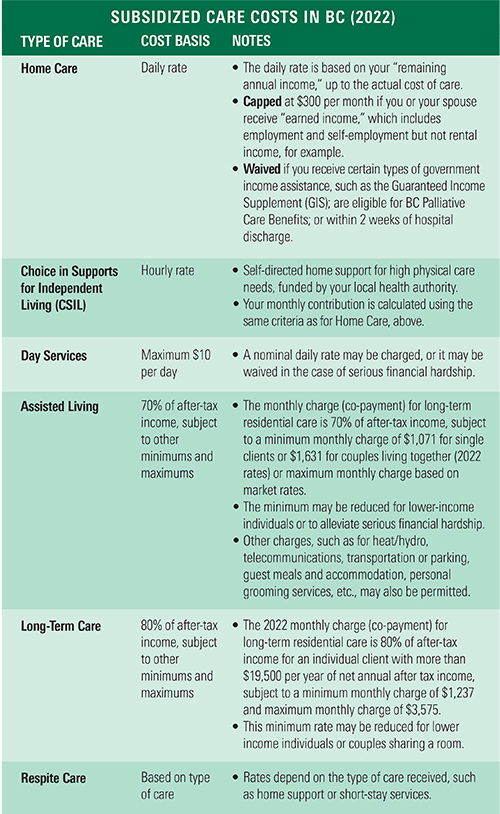How Are Care Costs Determined in BC?

By Heather Rivers, BA, CFP®, FMA
Communications and Education Specialist,
Odlum Brown Financial Services Limited
Many individuals prefer to live independently in their own homes for as long as possible. This brief overview of common care options in British Columbia and how costs are determined can help you and your loved ones plan ahead in case life changes eventually mean that you will need help with day-to-day activities or to move into a care facility.
In BC, you must be approved for publicly subsidized care services such as in-home support, adult day care, assisted living or long-term care facilities. Your needs will be assessed by a case manager from your regional health authority, and costs will be determined based on the type of care selected and your eligibility for temporary or yearly fee reductions or waivers.
 Five Common Types of Care in BC
Five Common Types of Care in BC
1. Home Care – Home care can help you maintain independence while living in your own home. Services may be limited in scope and frequency, and prioritized for people who need them the most. Generally, services can include personal assistance with activities of daily living such as mobility, nutrition, bathing and dressing, grooming and toileting, lifts and transfers, or cueing (providing prompts to assist with the completion of tasks). Specific nursing and rehabilitation directed by health care professionals may also be provided. Clients with high physical care needs may have an option for self-directed home care called Choice in Supports for Independent Living (CSIL). While most subsidized home care is long-term in nature, short-term care may be available if you are discharged from hospital or need end-of-life care.
2. Adult Day Services – If you cannot function independently because of chronic, health-related problems and require health care services or respite for your caregiver, you can consider attending an adult day program. Services can include health care and/or rehabilitation, therapeutic social and recreational activities, clinics, caregiver support and possibly transportation. The number of days you can attend will depend upon your personal needs and services available, and you can receive home care while enrolled.
3. Assisted Living (Retirement Home) – These residences can range from one-room units in a high-rise facility to self-contained apartments in a private home. By combining housing with hospitality (two nutritious meals a day) and personal care services (such as help with bathing, grooming, dressing and mobility), plus weekly housekeeping, linen laundry, activity programming and 24-hour emergency response, they help you to continue living independently. Your eligibility can depend on whether you are at significant risk by remaining in your own home, can make your own decisions, and require a supportive environment due to physical and functional health challenges.
4. Long-Term Care (Nursing Home) – If you require 24-hour professional nursing supervision that can no longer be met in your own home or in an assisted living residence, long-term care services can be approved. You are generally expected to indicate up to three preferred choices when applying for this care, and will be placed on a waitlist and expected to take the first available spot (within 48 to 72 hours of it becoming available). After initial placement, you can request a transfer to a preferred care home, based on your original position on the waitlist.
5. Respite Care – Respite care provides your primary caregiver with relief (respite) from the emotional and physical requirements of caregiving. Your respite care could range from home care or an adult day program, to temporary stays in an assisted living or nursing home. Publicly subsidized respite care can be arranged through your local health authority as part of your care plan, or private-pay options may be arranged directly with private facilities.
Care Costs and Public Subsidies
Costs can vary tremendously based on factors such as the type of care that you require, where you live, your income and eligibility for fee reductions or waivers. You must be approved for public subsidies through your regional health authority. The table below summarizes approximate fees and eligibility factors for subsidies or waivers.

Private Care Options in BC
1. Home Care – “Pay as you go” private home care can be independently arranged for tasks such as meal preparation, laundry, skilled nursing, occupational therapy, housecleaning or even basic personal care, but the hourly cost of services can quickly become a substantial monthly expense. Minimum costs range from approximately $20 per hour for in-home meal preparation, personal or live-in care to $45 per hour for skilled nursing (2021), but hourly costs could be much higher.
2. Adult Day Services – Some programs accept private-pay clients.
3. Assisted Living (Retirement Home) – These private-pay facilities may offer a greater choice of hospitality and personal care services to help you continue to live independently. Costs range from $1,387 to $9,180 monthly for a private room (2021).1
4. Long-Term Care (Nursing Home) – Some private-pay facilities offer a “campus of care” which allows
clients to remain in the same general facility area if their care needs progress beyond the parameters of
assisted living. Costs could range from $2,400 to $12,500 monthly for a private room (2021).1
5. Respite Care – Private-pay options for respite care could range from home or adult day care to a temporary stay in an assisted living or nursing home facility. Contact the facility or program directly.
If you would like more information on how Odlum Brown Financial Services Limited can assist you with planning for retirement and potential care costs, contact us through your Odlum Brown
Investment Advisor or Portfolio Manager.